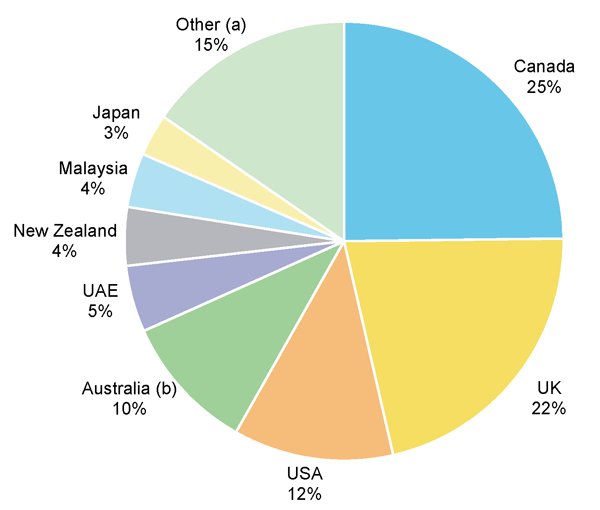Kali Sanyal, Economics
Key issue
Foreign investment in traditionally Australian owned and influenced sectors, such as agriculture, banking, air transport, telecommunications and shipping industries has led to foreign investment policy becoming a contentious and increasingly debated issue. |
Australia’s foreign investment policy consists of five elements:
Legislation
The Foreign Acquisitions and Takeovers Act 1975 (FATA) provides the legislative framework for the foreign investment screening regime.
Australia’s foreign investment policy
Australia’s foreign investment policy provides guidance to foreign investors on the Government’s approach to administering the FATA. The policy also identifies a number of specific types of investment proposals that are required to be notified to the Government even if the FATA does not appear to apply.
Private foreign investors are required to seek prior government approval before acquiring a substantial interest (upwards of 15%) in a corporation or control of an Australian business valued above $248 million (in 2013 prices, indexed annually). All foreign government owned entities must apply to the Government for approval of any acquisition of Australian assets, irrespective of the asset value.
However, for investors from New Zealand and the United States, the $248 million threshold only applies for investments in certain sensitive sectors. In other sectors, a $1,078 million threshold applies.
The Treasurer
The Treasurer is ultimately responsible for all decisions relating to foreign investment, and for the administration of Australian foreign investment policy. The FATA allows the Treasurer or his/her delegate (usually the Assistant Treasurer) to review investment proposals to decide if they are contrary to the Australian national interest. If this occurs, the Treasurer can block proposals, or apply implementation conditions to ensure that the national interest is protected.
Applicants have no right of administrative or judicial review of foreign investment decisions made under the FATA or the policy. The Administrative Decisions (Judicial Review) Act 1977 specifically exempts decisions made under the FATA from judicial review.
The Foreign Investment Review Board
The Treasurer is advised and assisted by the Foreign Investment Review Board (FIRB) which administers the FATA in accordance with the policy. The FIRB is an administrative body with no statutory existence, and FATA makes no reference to it. However, the foreign investment policy confirms the FIRB’s role. All decisions by the Treasurer relating to a foreign investment proposal are underpinned by analysis and recommendations made by the FIRB.
Prescribed sensitive sectors
Separate legislation imposes other requirements and/or limits on foreign investment in the following areas:
- the banking sector—foreign ownership in the banking sector must be consistent with the Banking Act 1959, the Financial Sector (Shareholdings) Act 1998 and national banking policy
- airports—the Airports Act 1996 limits foreign ownership of some airports to 49%
- the shipping industry—the Shipping Registration Act 1981 requires that a ship must be majority Australian-owned if it is to be registered in Australia, unless it is designated as chartered by an Australian operator
- the telecommunications sector—aggregate foreign ownership of Telstra is limited to 35% and individual foreign investors are only allowed a maximum of 5%.
Approved foreign investment in Australia
According to FIRB data, between 2007–08 and 2011–12, the total foreign investment approved was $844.8 billion. Of the total, mining comprised $348.4 billion (41.2%), services $155.9 billion (18.5%), manufacturing $111.3 billion (13.2%) and finance and insurance $42.6 billion (5%).
During the same period, the total approved investment in agriculture stands at $12.6 billion, or about 1.5% of the total foreign investment ($844.8 billion) approved by the Government.
Policy on foreign investment in agriculture
There has been a good deal of debate recently about foreign investment in agricultural land and businesses. As noted above, foreign government entities are subject to scrutiny for any investment proposal. Proposals from private investors in agribusinesses (including those involving agricultural land) are subject to the same thresholds that apply to other foreign acquisitions of Australian companies or business assets.
The Government assesses foreign investment applications by their impact on the following criteria:
- the quality and availability of Australia’s agricultural resources (including water)
- land access and use
- agricultural production and productivity
- Australia’s capacity to remain a reliable supplier of agricultural produce, both to the Australian community and trading partners
- biodiversity and
- employment and prosperity in Australia’s local and regional communities.
In 2011–12, the largest source country for investment by value in the agricultural sector was Canada ($1.4 billion), followed by the United Kingdom ($0.6 billion) and the United States of America ($0.5 billion).
The figure below indicates approved foreign investment in the agricultural sector by source country over the period between 2007–08 and 2011–12.

(a) all other countries excluding Australia.
(b) Australian-controlled companies in partnership with foreign interests and does not generally include the contribution attributable to minority Australian shareholders in companies with majority or controlling foreign shareholders.
From 2007–08 to 2011–12, Canadian ($3.1 billion), British ($2.7 billion) and American ($1.5 billion) firms were the largest investors in the Australian agricultural sector. (Data source: FIRB).
The national land register
In view of the absence of exact information regarding foreign land transactions at the national level, the Government recently initiated the process to form a national land register. The purpose of the register is to improve transparency of foreign ownership in agricultural land without imposing unnecessary burdens on investors or duplicating work already undertaken by State and Territory governments.
Further reading
Senate Rural and Regional Affairs and Transport References Committee, Foreign investment and the national interest, The Senate, Canberra, 2013.
The Treasury, Establishing a national foreign ownership register for agricultural land: consultation paper, Canberra, 2012.
For copyright reasons some linked items are only available to members of Parliament.
© Commonwealth of Australia